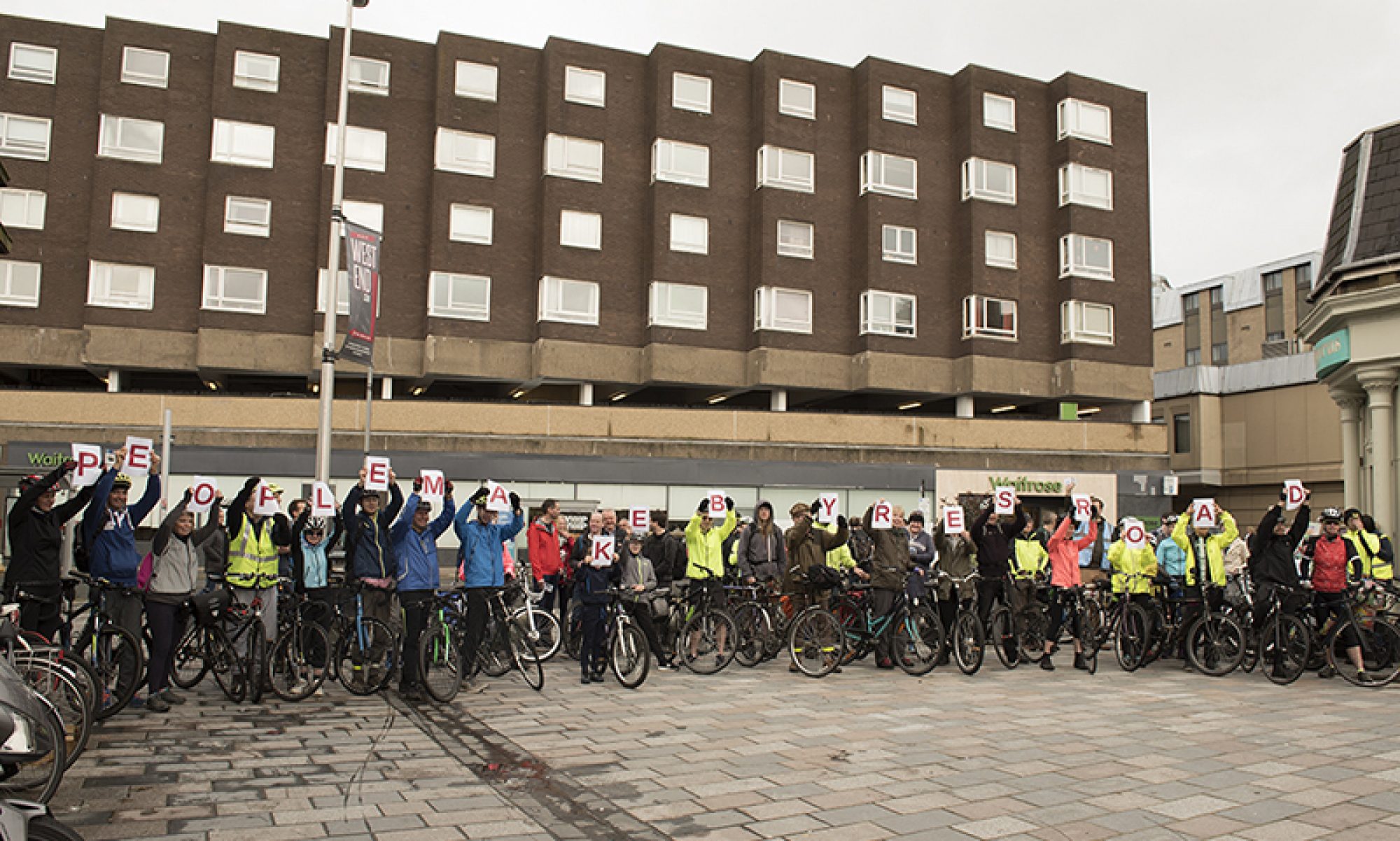GoBike was formed in the 1980s previously known as the Glasgow Cycling Campaign and, as such we produced a Bike Plan for a Better Glasgow, which is still relevant today. The group was active in Glasgow, East Renfrewshire and East Dunbartonshire, but then energy was lost with only a few people keeping the group going until a revival from 2010 onwards.
Here are the changes GoBike have pressed for over the years and why – updates in italics:
WHAT WE PROPOSED
- Network. Improving facilities for cyclists should be part of an overall integrated transport plan for Glasgow.
- Traffic calming The speed limit should be lowered to 20mph. As the average speed of a car in traffic is about 10mph, what’s to be gained from doing 30?
- Bridges are important in any transport network. We proposed that action be taken to make crossing the Clyde safer for cyclists. The four road bridges should each have a cycle lane, and the four pedestrian bridges be made shared use pedestrian/cycle facilities.
There are cycle lanes on George V Bridge and Glasgow Bridge, shared bus lanes on the Clyde Arc Bridge and Victoria Bridge, and cycles are allowed on Bells Bridge, Tradeston Bridge and the 2 suspension bridges, ie the Carlton Place to Customs House Quay Bridge and the bridge in Glasgow Green. - Cycle Lanes already exist in some places. There should be a comprehensive network. There is great scope for cycle lanes on roads parallel to the motorway, such as Alexandra Parade and Paisley Road West.
There are now some good, segregated cycle routes in the city, with the South West City Way from Shields Road to the south side of the Clyde and through towards Rutherglen being the best example. There is still much work to be done on the major arteries where cycling rates are high. - Junctions are a major source of danger for cyclists. All junctions should be examined and improved. Junction improvement can be as simple as altering traffic lights from 3 to 4 phases (sorely needed at the top of Byres Road), or more advanced with special traffic lights for cyclists.
- Public Transport has its role too. With bikes already carried free on Strathclyde trains, highly convenient and efficient journeys are possible. This is good, and should be better advertised. Both local and Scotrail trains should have dedicated spaces for bikes.
- Secure Park and Ride facilities should be provided at underground stations, and bike lockers at mainline stations.
- Workplace Facilities should be encouraged. All new buildings should have bike parking spaces, and showers and changing rooms.
- Bike Racks need to be everywhere. The Region has made a good start, but many more racks are needed. Cycle racks are now relatively plentiful in Glasgow.
WHAT THE BENEFITS ARE
-
- Freedom to move. A city safe for cyclists is a better place for everyone. A bike friendly Glasgow will be quieter, cleaner, healthier and safer. It will be easier to cross the road, easier to breathe and more friendly.
- Children will benefit. 20 years ago most children walked to school alone. Now many parents feel they must drive them to school as the roads are so dangerous. This is counterproductive. It should be safe for children to walk or cycle to school.
- Older people who grew up when cycling was a common and ordinary means of transport, are discouraged from cycling by modern traffic. They should be able to ride without fear.
- Congestion relief. Stand beside any busy road in Glasgow and watch what goes past. Most cars carry only one person. This is appallingly inefficient in terms of energy and space. Most journeys made by car are short, the majority under five miles, and a large proportion under two miles. These short trips can easily be made by bike. Cycling uses 1/10th the road space of car travel, 1/50th of the energy, causes no pollution and in urban areas is faster. There simply isn’t enough space for everyone to use a car. Bike provision is very cheap.
- Air Pollution. Motor vehicle exhausts are now the main source of air pollution, contributing 50% of CO2 and other noxious gasses. This has caused a marked rise in asthma and other lung complaints.
- Health. Regular cyclists live an average of 10 years longer than those who don’t take exercise. You only need to do a few miles a day to reap the benefits.
- Public Safety will improve. Bicycles don’t kill people. Cars do. Cycling in traffic isn’t as dangerous as some people like to think though. The BMA have calculated that there is only one death for every ten million miles cycled.
Want to make things better?
Join GoBike and continue to campaign for a better Glasgow.



One Reply to “Our History”